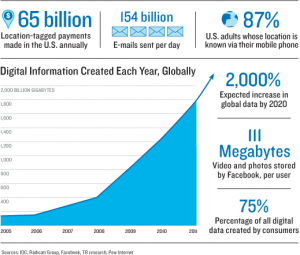In this internet age, where more and more data is being created by individuals, is it possible to maintain anonymity? In the infographic below, it is hard to ignore the fact that with each passing year, more and more digital information is being created around the world. By the year 2020, that data is expected to increase by an astounding 2,000%.

According to Princeton professor Arvind Narayanan, “the level of anonymity that consumers expect – and companies claim to provide – in published or outsourced databases is fundamentally unrealizable.” With such an increase of data in the digital world, the less private this information is. Writer Patrick Tucker points out that Facebook stores “around 111 megabytes of photos and videos for each of its users, who now number more than a billion.” With that much data being collected, it is not surprising that anonymity online is nearly impossible.
Certain companies, like Acxiom, exist to collect and analyze customer information that they, in turn, give to their clients to help them reach their marketing and advertising goals. But concerns over privacy have forced the Federal Trade Commission (FTC) to step in. Earlier this year, the FTC issued orders to nine different data brokerage companies, including Acxiom, to get information about how they collect and use data. The responses the FTC receives will be used to determine how data brokerage companies can improve their privacy practices and offer more transparency.
Although more information is being shared digitally with each passing day, people strive to maintain anonymity and privacy. With news that the FTC is taking steps to ensure data brokerage companies are transparent, individuals may be able to feel more confident knowing that their information remains in the right hands.
For more information about big data and privacy, read the full article here.